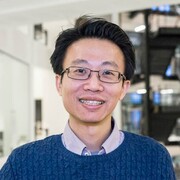Events
Dec 20, 2023
Seminar (2023-12-20)
School of Biomedical Sciences is pleased to invite you to join the following seminar:
Date: 20 December 2023 (Wednesday)
Time: 11:30 am – 12:30 pm
Venue: Lecture Theatre 1, G/F, William M.W. Mong Block, 21 Sassoon Road
Speaker: Professor Patrick Cai, Chair of Synthetic Genomics, Manchester Institute of Biotechnology, The University of ManchesterTalk Title: Engineering a tRNA neochromosome
Biography

Professor Patrick Cai (PC, Manchester) is Professor in Synthetic Genomics and a world-leading expert in synthetic chromosomes, with a highly interdisciplinary research group. In 2017, Prof. Cai’s team published 7 research articles in the journal of Science and featured on its cover. PC is the international coordinator for the (Sc2.0) Consortium, which is composed of over 10 top universities from 4 continents aiming to synthesize the world’s first synthetic eukaryotic genome. PC founded Edinburgh Genome Foundry, which is the largest automated DNA synthesis and assembly facility in academia today. PC regularly provides advice and consultancies to the Cabinet office, the Foreign Office and the Prime Minister’s Council for Science and Technologies. PC holds prestigious visiting professorships with MIT (US), MRC LMB at Cambridge (UK), Hong Kong University and Chinese Academy of Sciences (China). In 2022, PC was awarded a 5year EPSRC fellowship to work on biosecurity and biosafety mechanisms for synthetic genomes. In 2023, PC was awarded an ERC Consolidator Award to engineer non-coding RNAs using a synthetic genomics approach.
Abstract
Here, we report the design, construction, and characterization of a tRNA neochromosome, a designer chromosome that functions as an additional, de novo counterpart to the native complement of Saccharomyces cerevisiae. Intending to address one of the central design principles of the Sc2.0 project, the 190-kb tRNA neochromosome houses all 275 relocated nuclear tRNA genes. To maximize stability, the design incor- porates orthogonal genetic elements from non-S. cerevisiae yeast species. Furthermore, the presence of 283 rox recombination sites enables an orthogonal tRNA SCRaMbLE system. Following construction in yeast, we obtained evidence of a potent selective force, manifesting as a spontaneous doubling in cell ploidy. Further- more, tRNA sequencing, transcriptomics, proteomics, nucleosome mapping, replication profiling, FISH, and Hi-C were undertaken to investigate questions of tRNA neochromosome behavior and function. Its construc- tion demonstrates the remarkable tractability of the yeast model and opens up opportunities to directly test hypotheses surrounding these essential non-coding RNAs.
ALL ARE WELCOME
Should you have any enquiries, please feel free to contact Miss Angela Wong at 3917 9216.

